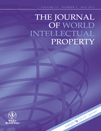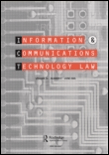
Journal of World Intellectual Property
metrics 2024
Illuminating the Path of Intellectual Property in a Globalized World
Introduction
Journal of World Intellectual Property is a premier academic journal published by WILEY, specializing in the critical and evolving intersection of law and intellectual property on a global scale. With an ISSN of 1422-2213 and an E-ISSN of 1747-1796, this journal provides a platform for rigorous research and discussion among legal scholars, practitioners, and policymakers. The journal has garnered recognition within the academic community, achieving a Q3 ranking in the Law category and ranking #336 out of 1025 in the Scopus Law category, situating it in the 67th percentile. Covering a range of topics from international copyright to patent law, the journal aims to explore the complexities and implications of intellectual property rights as they evolve in a rapidly globalizing world. Published in the United Kingdom, this journal is accessible to those eager to contribute to and stay informed about advancements in intellectual property law from 2002 to 2024, fostering a rich dialogue among researchers, professionals, and students alike.
Metrics 2024
 0.21
0.21 0.70
0.70 0.80
0.80 13
13Metrics History
Rank 2024
Scopus
IF (Web Of Science)
JCI (Web Of Science)
Quartile History
Similar Journals

International Journal of Law and Information Technology
Advancing Scholarship at the Intersection of Law and IT.The International Journal of Law and Information Technology, published by Oxford University Press, stands as a leading forum for the exploration of the evolving intersection between law and information technology. With its ISSN 0967-0769 and E-ISSN 1464-3693, this esteemed journal has been at the forefront of academic discourse since its inception in 1993 and is poised to continue influencing the landscape of legal scholarship and information sciences until at least 2024. With a prestigious categorization in the Q2 quartile for both Law and Library and Information Sciences, the journal is prominently ranked in the 76th and 64th percentiles respectively within Scopus rankings. Offering insights on vital themes such as privacy, intellectual property, and technological regulation, the International Journal of Law and Information Technology provides a valuable resource for researchers, practitioners, and students alike, facilitating a deeper understanding of the legal challenges and opportunities presented by technological advancements. While not an open-access publication, the rigorous peer-reviewed articles serve to enrich the global academic community’s knowledge in this critical and dynamic field.

China-EU Law Journal
Navigating the Complexities of International LawChina-EU Law Journal, published by SPRINGER HEIDELBERG, serves as a pivotal platform for discourse in the field of international law, particularly focusing on the legal dynamics between China and the European Union. With its ISSN 1868-5153 and E-ISSN 1868-5161, the journal caters to a growing audience interested in understanding the complexities of legal relations, policy frameworks, and regulatory challenges that arise within this crucial geopolitical arena. Although currently not labeled as open access, the journal strives to provide rigorous peer-reviewed articles that contribute significant insights into the evolving legal landscape, making it an essential resource for researchers, practitioners, and students alike. By fostering scholarly dialogue, the China-EU Law Journal aims to enhance the academic community's understanding of cross-cultural legal perspectives, further cementing its role in shaping modern legal thought.

Vestnik Permskogo Universiteta-Juridicheskie Nauki
Empowering Researchers with Open Access Legal StudiesVestnik Permskogo Universiteta-Juridicheskie Nauki, published by the Perm State National Research University, serves as a prominent platform for the dissemination of legal scholarship since its inception. With an Open Access policy implemented in 2009, this journal offers a wide range of legal studies, including comparative law, constitutional law, and international law, making it an essential resource for researchers, academics, and practitioners in the field. Although it is a relatively young publication, its commitment to quality and accessibility has established it as a respected voice in jurisprudence, contributing significantly to both national and international legal discourse. Researchers and students alike will find valuable insights within its pages, encompassing the latest developments and theoretical advancements within Russian and global legal systems. For those looking to stay informed on current legal issues and academic debates, this journal is a must-read.

Australian Intellectual Property Journal
Championing Excellence in IP Research and EducationThe Australian Intellectual Property Journal, published by LAWBOOK CO LTD, is a premier academic platform dedicated to the scholarly examination of intellectual property law in Australia and beyond. With its ISSN 1038-1635, this journal serves as an essential resource for researchers, legal professionals, and students alike, aiming to foster a deeper understanding of the complexities surrounding intellectual property rights, policies, and practices. Notably, the journal retains a reputation for publishing high-quality, peer-reviewed articles that contribute significantly to the field, making it indispensable for anyone involved in intellectual property research. While currently not open access, the journal encourages the dissemination of knowledge through strategic collaboration and innovative formats. Its address, LEVEL 6, 19 HARRIS ST, PYRMONT, NSW 2009, AUSTRALIA, reflects a commitment to addressing local and international issues in intellectual property, ensuring that the content remains relevant and impactful in a rapidly evolving legal landscape.

International Journal of Cyber Warfare and Terrorism
Contributing to the Global Discourse on Digital SecurityThe International Journal of Cyber Warfare and Terrorism is a critical resource for researchers, professionals, and students exploring the multifaceted domains of cybersecurity, warfare, and the implications of digital terrorism. Published by IGI Global, this journal provides a platform for innovative and interdisciplinary research, contributing significantly to the understanding of current challenges in the digital landscape. With an ISSN of 1947-3435 and E-ISSN 1947-3443, the journal covers a range of essential categories, including Computer Networks and Communications, Hardware and Architecture, and Information Systems Management, reflecting its commitment to addressing urgent issues in computer science and safety research. Though currently categorized in Q4 of multiple scientific sectors, the journal stands as a beacon for emerging scholarly thought and practical applications in combating cyber threats and enhancing digital resilience. While the journal is not open access, its findings are crucial for academic discourse and policy-making in an increasingly interconnected world, making it a valuable asset for anyone involved in the study of cyber threats and defenses.

BOSTON UNIVERSITY LAW REVIEW
Exploring the forefront of legal innovation.BOSTON UNIVERSITY LAW REVIEW, a premier legal journal based in the United States, is widely recognized for its contributions to the field of law. Since its inception in 1973, this esteemed publication, with ISSN 0006-8047, has provided a platform for rigorous scholarship and innovative discourse in legal theory and practice. Published by BOSTON UNIV LAW REVIEW, the journal is categorized in the top-tier Q1 of law journals as of 2023, reflecting its high impact and relevance in legal scholarship, backed by a solid Scopus ranking of #219 out of 1025 in Social Sciences _ Law, placing it in the 78th percentile. While not an open-access journal, it remains a vital resource for legal researchers, practitioners, and students, offering comprehensive analyses and insights that inform contemporary legal practices. With a commitment to advancing legal understanding, the BOSTON UNIVERSITY LAW REVIEW seeks to engage and inspire critical thought among its readership.

PRZEMYSL CHEMICZNY
Illuminating Insights in Chemical Processes and ApplicationsPRZEMYSL CHEMICZNY is a distinguished journal published by WYDAWNICTWO SIGMA-NOT SP ZOO, operating out of Poland since its inception in 1973. This periodical serves as a vital platform for disseminating innovative research in the realms of Chemical Engineering and Chemistry, albeit currently categorized in the Q4 quartile, indicating opportunities for growth and development within these fields. Despite its challenges, the journal showcases a diverse array of scholarly works, providing insights that are crucial for advancing knowledge and practices in chemical sciences. The journal is recognized for promoting research collaborations and fostering discussions among researchers, professionals, and students who are keen on exploring the intricacies of chemical processes and engineering applications. Although it does not currently offer open access, PRZEMYSL CHEMICZNY remains an essential resource for academics and professionals navigating the complexities of the chemical industry. For those interested in contributing or accessing research, the journal continuously encourages submissions and engagement from the community, highlighting its commitment to the progressive development of chemical research.

HARVARD LAW REVIEW
Exploring the Depths of Legal Insight.HARVARD LAW REVIEW, an esteemed publication by the Harvard Law Review Association, stands as a cornerstone of legal scholarship in the United States, boasting an impressive ISSN of 0017-811X and E-ISSN 2161-976X. Renowned for its rigorous editorial standards and comprehensive analyses, this journal occupies the prestigious Q1 category in Law, ranking #149 out of 1025 in Scopus, which places it in the 85th percentile among its peers in the Social Sciences Law category. With a publication history stretching from 1973 to 2024, it consistently features groundbreaking articles, influential essays, and critical commentaries that shape contemporary legal thought. Although not an open-access journal, HARVARD LAW REVIEW remains indispensable for researchers, professionals, and students who seek to engage deeply with the evolving landscape of law. Its rigorous academic focus empowers scholars and practitioners alike, making it a vital resource in the field.

Information & Communications Technology Law
Decoding the Legal Landscape of Information TechnologyInformation & Communications Technology Law, an esteemed journal published by Routledge Journals, Taylor & Francis Ltd, serves as a vital platform for the dissemination of critical research and analysis in the intersecting fields of law, communication, and computer science. Established in 1992, this journal has continuously evolved to address the dynamic landscape of information technology and its legal implications, maintaining a significant H-Index that reflects its scholarly impact. With a notable impact factor that places it in the second quartile for communication and law disciplines, and in the third quartile for computer science applications as of 2023, it ranks impressively within the Scopus Metrics—highlighting its relevance and reach among global academia. Covering vital topics from data privacy to intellectual property rights in the digital age, the journal appeals to researchers, practitioners, and students alike by offering insightful articles that explore contemporary issues and emerging trends within ICT law. Although it does not currently offer open access options, its comprehensive articles and reviews are indispensable for anyone seeking to understand the complexities of technology regulation and legal frameworks.

MINNESOTA LAW REVIEW
Cutting-edge Insights into Contemporary Legal IssuesMINNESOTA LAW REVIEW is a prestigious academic journal dedicated to advancing legal scholarship and discourse, published by the MINN LAW REVIEW FOUND in the United States. Established in 1976, this journal has become a cornerstone in the field of law, achieving an impressive Q1 ranking in the Law category for 2023, underscoring its significance and influence in legal studies, with a Scopus rank placing it in the 65th percentile among social sciences law journals. The ISSN number for both print and electronic editions is 0026-5535, ensuring broad accessibility to its scholarly contributions. With a commitment to publishing innovative and analytical articles that address contemporary legal issues, the MINNESOTA LAW REVIEW serves as an essential resource for researchers, students, and legal professionals seeking to deepen their understanding and engage with critical legal concepts. While it does not currently provide open access, its wide array of topics spans various disciplines within law, fostering a vibrant academic community dedicated to the exploration of legal principles and their applications. The journal’s editorial office can be found at 229 19TH AVE SOUTH, UNIVERSITY OF MINNESOTA, MINNEAPOLIS, MN 55455, where a team of experts curates content that reflects the evolving landscape of legal thought.